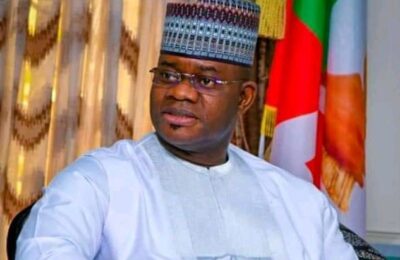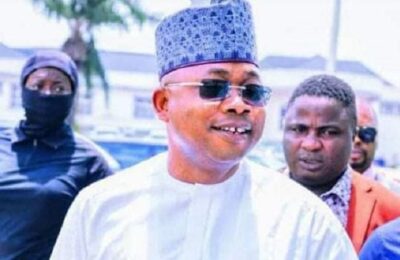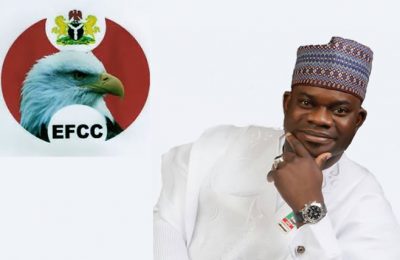The turn of events in our dear Kogi state since the passing on of the Prince of the Niger, Abubakar Audu (Ada’oja as he is popularly known by his ardent followers, admirers and haters alike–may God forgive his shortcomings as his soul continue to rest in peace, Ameen), is best described as worrisome. The situation created what has now assumed the status of a leaderless people, akin to the flock without a shepherd saying.
Appreciating the enormity of the situation, the incumbent administration has tried to provide leadership for a supposedly republican people with a style of leadership that is youthful, daring READY to lead its people to that prosperous and progressive future. In the wake, several discordant voices have roared, with each protagonist playing the self righteous and better knowing game. What if 2023 comes?
It has been variously proven, that the long term salvation of any people or society depends on the quality of its present and future leaders. This must no longer be ignored. It is today a notorious imperative, that governance must give space to only such people that possess maximum and demonstrated empathy for the people by providing relevance to the qualitative movement of the society.
The incumbent administration in Kogi through the likes of Edward Onoja as arrow head is demonstrating this and must be supported. Leadership as has been shown by this administration since 2016, can be made in Kogi. But how can we make this evolution sustainably efficacious in the new Kogi scenario?
Let us hazard a closer look at the VARIOUS administrations that have governed the state since 1991. A general assertion has been that an Audu administration would have provided better leadership for the state than all the others. So, why was he voted out for Ibrahim Idris? I heard someone voicing another day, another day. Let me concede here.
But with an Audu leadership, many have argued perhaps, he would have projected by several decades, for a long term socio-political, industrialization and economic revival plans that makes the way for sustainable leadership succession (triangular equilibrium) centred on economy, industrialization and infrastructure development for the state; that will be equitable, just and fair. A fair discussion by wailers and hailers of the incumbent is suggested, would have been more of what, where, how and when this can be a reality in Nigeria’s North Central and gateway state. But again, these are the hallmark of the Bello administration.
Following the footsteps of Audu, the incumbent has taken leadership in development to the laundry and will only get better. Like Audu, one of the first steps taken in 2016 was the inauguration of the New Direction Blue print projected for four years (2016-2019). The next phase of the projection considers all options and is a long haul into the New Kogi Scenario.
Right from the taking of the oath of office by the incumbent in January, 2016, the Kogi political atmosphere and existence has been permeated with news of marginalization, thievery, corruption, nepotism, ethnic bigotry, unpaid salaries; deprived and impoverished civil service, unemployment, crime and criminality (in new forms) – the same ills that demand for regime change and ultimately, the ousting of the Wada/PDP administration.
These tinges have not become anachronistic in Kogi State. The nuances have rather deepened in intensity with hunger (as a result of the delay and not refusal to pay workers’ due salaries) and goons (a new form of militia and insecurity) fitting state tools for coercing the rural folks.
I have yet to see, a more damaging narrative of any administration or political leader in the recent past. As a matter of fact, the opposition have continuously painted a picture of negatives for the state. A situation that festered but was strategically brought under focus by the Edward Onoja initiative to speak to opposition in the last week of March, 2019. It generally agreed that the scope of the meeting be broadened for more impact. That was a good leadership move.
But for three years now, the scenario has been nauseating. The portrait has been that of escalating poverty in the land (forgetting that this has a national spread), that the Public Servants, despite promise of Public service and pension reforms by the administration are unhappy to say the least; The people they argue, are far from being rehabilitated as the economy they also claim, has degenerated much from the 16 years and pre-PDP situation (2000 -2016).
Habaaaa! This is a warped narrative on the Bello administration in Kogi State, for those on the ground. Kogi state needs towering leaders to swaddle and extricate it from its present imbroglio. The dearth of leadership as apparent today ought not to be. Is it not shameful, that responsive leadership or is it followership, has eluded the Kogi political space and is becoming a permanent narrative if not addressed? Don’t the youths have the swag any longer? Are these youths in Kogi different from the ones in Lagos, Ogun or Cross Rivers states who are doing exploits but under positive guidance from experienced elders?
With the count down to the 2019 elections, can this youth in Kogi deliver the much taunted political leadership or will the people vote them out in the impending November referendum to readmit the older folks once again in the political space? Will Kogi ever benefit from its bright minds within and in the diasporas? Where are the proverbial leaders of tomorrow?
Kogi deserves a better deal. And that is what the incumbent is saying. Leadership should not be portrayed as a burden, as leadership and governance in the African countries and their subnational entities have been made to look very problematic.
Afegbua, Salami Issa et al (2012) had observed that the quality of leaders has become a major issue in the establishment of the democratic process and its success. To overcome the crises of leadership and governance, those on whom the burden of leadership falls must fully comprehend their responsibilities, duties and obligation. They must also be exposed and be prepared to face the challenges of leadership in the society. (Afegbua, Salami Issa et al International Journal of Academic Research in Business and Social Sciences September 2012, Vol. 2, No. 9 ISSN: 2222-6990)
Relying on what we know of the past, Kogi’s failures have come about largely as a result of the absence of recognizable leadership across its length and breadth, lack of ideology, policy reversal and weak institutional patterns. How ready are the leaders today if we divorce the ruling block at the various levels from the offices? Can ruler-ship confer automatic leadership on office holders? This is the challenge.
It is fascinating to see knowledgeable youths taking up political and economic leadership today. This is seen in the fact that global leadership is gradually shifting to the youth with about 12 world leaders today under the age of 40. These includes: McCron of France 39, New Zealand has 37 year-old Jacinda Ardern leading the country, Ireland – Leo Varadkar, 38, Austria – Sebastian Kurz, 31 and so on. This is encouraging and the Nigerian “Not too Young to Run” legislation can further support this clamor. But, can leadership be legislated?
For the Confluence State, we are indeed at a crossroad. The incumbent has made it sacrosanct that genuine love for fatherland must now be at the centre of our political and development concerns that all (aspiring or itinerant) leaders must get involved in the future of our land. Leaders must daily strive to find a happy outlet through which the state would be able to play a role at the forefront of national and global development.
A new generation of leaders must now be the norm. The new leaders must be those that are capable of facing up to the challenges of fragmentation of the State, consolidating the foundations of the post-creation era, promotion of democracy and human rights and the implementation of world class conditions for security, peace and investments -the gauge of sustainable development. The ways in which these various challenges are tackled for the emergence of the New Kogi are crucial, and it remains a core leadership agenda of the incumbent.
As November 2019 approaches, manifold developments are unfolding in the political firmament with visible alignments. The question of leadership in the NEW Kogi Scenario therefore, becomes most critical. For many, there are three identifiable categories of players in the Kogi political space, namely: politicians, business leaders and the intellectual elites, who must all begin to find expression. The role of each of these players remain key determinants of who emerges as #LeaderNext and in the management of the State.
In this search for #LeaderNextMatrix, the political leaders are vaguely classified into several groups depending on their background, level of education, their political commitment and the period in which they entered the political arena. And there are several of them. Over the years in Kogi State, the various administrations had individuals trumped up for diverse reasons with some of them assuming larger than life postures.
Kogi State is a political hotbed in every context as most elections often record violence and deaths thus leading to suspension or outright cancellation of polls. For instance, the 2019 general elections were marred with violence and recorded casualties. The cities of Ayangba, Ganaja, Bassa, Adankolo and other reported places were “notoriously” captured in the news. This is largely attributable to the delinquent political culture with poorly educated and exposed players. It is this players’ conduct that guide the followers to act in all manners.
Unfortunately, too, we find how each exiting administration swell the number of vituperating politicians who basically go into oblivion or continue to demonstrate such nuisance value disguised in opposition politics in order to remain relevant or find a new appointive position in the new administration. This has not only rubbed on jurisdictional political development but also worsened leadership development in the area to the advantage of the discerning spirit. The incumbent administration saw all these gaps through its White Oracle and thus, began to do the needful to provide and assumes political leadership for the time being and into the future in the NEW Kogi SCENARIO.
Already, the evolving state and national Assembly synergy occasioned by the just concluded elections, provides a glimpse into the future of cooperation by the parties for overall development in the state. Such synergy envisioned by the incumbent synergy is progressive and results oriented and must be taken on its value adding character for general acceptance.
Business leaders
The question of leaders goes beyond simple political figureheads. If they play their cards well, the business leaders finances and determines who gets what and when as the challenge of economic and social development is set to both public sector and private business leaders.
In Kogi State, the role of this category of leaders has been marginal as most of the electoral matters hither to now, are decided by external persons as the real players in Kogi’s economic development are the civil servants which earned it the civil servant state devoid of notable business leaders.
Several administrations have worked on reversing this trend by getting the private sector to drive the economy. The efforts of the incumbent (Yahaya Bello) administration stand out with its private sector engagement policy which saw the establishment of the state Bureau for public private partnerships to drive and institutionalize the initiative.
The private sector visibility in the economy today appear better than the tears before and it will progressively get better.
Today, though there is still much to be achieved in the economic angle, the policy has achieved many positives.
For instance, the private sector involvement in agriculture (agribusiness) which has resulted in the green house farming technology in the state, the multi million naira Odo Ere and Omi rice mills, has project agriculture as a star sector for the administration going by its performance to date and in comparison. The automatic vehicle inspection facility PPP at Felele, the education sector school based management committees’ initiative and several other private sector interventions in the environment sector that have brought added value to public sector business are positive things that are happening under the incumbent administration. These are remarkable leadership and governance initiatives achieved by the incumbent leadership who is also willing to do more.
The new generation of leaders and development requirements
In the NEW Kogi SCENARIO, the political responsibility of leaders is top on the agenda. The incumbent sees it as a phenomenon that will be based on the relationship between power and performance, in particular the performance of the actors. The issues of concern for the new generation leaders must include conversations like:
- “What will the configuration and nature of the present political powers be on the grassroots, knowing that politics is a local affair?”
- “What will the configuration and nature of the different political, religious, economic and intellectual powers be on the grassroots?”
- “What possibility will there be for the present political powers to control the grassroots and ensure victory for the administration at the polls so as to defend the fundamental leadership transition agenda of the incumbent?”
- “What possibility will there be for the electorate to influence these powers and ensure their balance so as to defend the fundamental interests of the people in the issues of livelihoods, education and health, indeed to spiritual and material happiness in dignity?”
- “What will Kogi’s place be in today’s interdependent world?”.
The answers to these questions bring us back to how best we are able to manage and strategize on the main challenges of the ongoing fragmentation of political areas, fragmentation of historical conscience and fragmentation of knowledge in our political space.
The world is moving toward a more digitized society and economy by exploring the context of the 4th Industrial Revolution which is changing the way we live and do business. The 4th Industrial Revolution, also tagged Industry 4.0, is defined as “a range of new technologies combining the physical, digital and biological worlds”. It brings with it higher levels of automation and data exchange in manufacturing where it lifts production processes to a new level of capability.
Rapid transformations in the design, manufacture, operation and service of manufacturing systems and products have a huge potential to drastically improve the flexibility and productivity of business and organizations.
There is indeed, a whole lot of implications for politics and governance in our clime if we must take advantage of the benefits of how higher levels of autonomous processes and machinery will impact skills and jobs, and how higher flexibility in the integration of supply, production and delivery processes, could be used for new governance excellence with its unrivaled opportunities in socio-economic dimensions for our people. The right leadership can indeed, help a people achieve these benefits.
While Politics is in the air and gladiators are striving had for the soul of the state as usual, the incumbent leadership is working hard to galvanize the political, economic and intellectual resources necessary to turn the state around. The incumbent also possesses the capacity and mien to ensure the state and its people benefit maximally from the permeating knowledge of the fourth industrial consternation. The people deserve to appreciate now, what the character and goal of the next leaders must be, if Kogi must become a place of reckoning in the national schema. We can see and feel the potential in this genre.
– Oche Akor writes from Lokoja.




